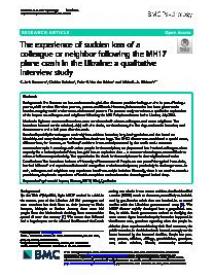The experience of sudden loss of a colleague or neighbor following the MH17 plane crash in the Ukraine : a qualitative interview study
Background: The literature on loss and traumatic grief after disasters provides findings on the impact of losing a partner, child or close friend on partners, parents and friends. However, little attention has been given to the broader everyday social environment of deceased persons. The present study constitutes a qualitative exploration of the impact on colleagues and neighbors following the MH17 airplane disaster in the Ukraine, July 2014.
Methods: Eighteen structured interviews were conducted with eleven colleagues and seven neighbors. The interviews focused on the relation(−ship) with the victim, on the disaster, the first days and weeks hereafter, and the status one and a half years after the crash.
Results: Especially for colleagues and neighbors with an intensive, long-lasting relation and ties based on friendship and trust, the impact of the sudden death was large. The MH17 disaster was considered a special event, different from, for instance, an “ordinary” accident. It was actively covered by the media and a recurrent conversation topic in meetings with other people. In the workplace, employers and less involved colleagues show empathy for a limited period of time, but grief has an expiration date – a moment where it gets more difficult to others or influences productivity. The appreciation for rituals in the workplace or in the neighborhood varies.
Conclusions: The interviews indicate a “hierarchy of bereavement”. People are not part of the typical inner circle, but feel “affected” and experience little social recognition and acknowledgment, particularly in the longer term. As such, colleagues and neighbors may experience loneliness and/or isolation. Generally, there is no need to consult a practitioner, despite the experience of health complaints such as intrusive dreaming and lack of sleep.
Geachte bezoeker,
De informatie die u nu opvraagt, kan door psychotraumanet niet aan u worden getoond. Dit kan verschillende redenen hebben,
waarvan (bescherming van het) auteursrecht de meeste voorkomende is. Wanneer het mogelijk is om u door te verwijzen naar de bron
van deze informatie, dan ziet u hier onder een link naar die plek.
Als er geen link staat, kunt u contact opnemen met de bibliotheek,
die u verder op weg kan helpen.
Met vriendelijke groet,
Het psychotraumanet-team.
In: BMC Psychology ISSN: 2050-7283 | 8 | 16
https://doi.org/10.1186/s40359-020-0379-8
Open Access


